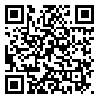Volume 28 - Supplementary
IBJ 2024, 28 - Supplementary: 57-57 |
Back to browse issues page
Download citation:
BibTeX | RIS | EndNote | Medlars | ProCite | Reference Manager | RefWorks
Send citation to:



BibTeX | RIS | EndNote | Medlars | ProCite | Reference Manager | RefWorks
Send citation to:
Hasanzadeh L, Morevati Sharif Abad M A. Effectiveness of Working Memory Treatment on Naming Ability in Elderly People with Mild Cognitive Impairment Living in Bushehr City. IBJ 2024; 28 :57-57
URL: http://ibj.pasteur.ac.ir/article-1-4432-en.html
URL: http://ibj.pasteur.ac.ir/article-1-4432-en.html
Abstract:
Introduction: Word-finding deficits are a primary challenge for patients with mild cognitive impairment. In contrast, healthy individuals can retrieve words in a fraction of a second. Naming tasks for those with mild cognitive impairment may take several minutes to complete, potentially resulting in frustration or failure. Older adults with mild cognitive impairment often have impaired working memory, which causes deficiencies in language and communication skills. Few studies have been conducted on the effect of working memory therapy and naming in the elderly with mild cognitive impairment. The current study aimed to investigate the effectiveness of working memory treatment on naming ability in older adults with mild cognitive impairment.
Methods and Materials: This research was a randomized clinical trial. The statistical population consisted of men and women aged over 60 years with mild cognitive impairment, defined as a score below 26 on the Montreal Cognitive Test, residing in Bushehr City in 1402. Using a specific formula, 48 participants were selected from the available sample. They were randomly assigned to the intervention and control groups, with each group comprising 24 members. The intervention group received the working memory therapy program in 12 sessions of 45 minutes, while the control group did not receive this treatment. The research tools were the Montreal cognitive test, working memory test (word and number span), and naming test (vocabulary acquisition evaluation in Persian). Data were analyzed using a multivariate analysis of the covariance test.
Results: The working memory treatment resulted in a significant increase in the exposure naming test scores for the elderly in the intervention group (p = 0.001). Additionally, there was a significant increase in the verbal fluency test score for the same group (p = 0.005). Furthermore, the treatment led to a significant improvement in the continuous speech analysis test scores among the elderly participants (p = 0.001) A noteworthy finding of this study is that the treatment positively implicated both the average cognitive status scores and active memory following the intervention.
Conclusion and Discussion: Working memory treatment improved naming ability (confrontational naming, verbal fluency, and continuous speech analysis) in elderly with mild cognitive impairment. Therefore, this treatment can enhance naming skills in these individuals, making its implementation particularly important.
Methods and Materials: This research was a randomized clinical trial. The statistical population consisted of men and women aged over 60 years with mild cognitive impairment, defined as a score below 26 on the Montreal Cognitive Test, residing in Bushehr City in 1402. Using a specific formula, 48 participants were selected from the available sample. They were randomly assigned to the intervention and control groups, with each group comprising 24 members. The intervention group received the working memory therapy program in 12 sessions of 45 minutes, while the control group did not receive this treatment. The research tools were the Montreal cognitive test, working memory test (word and number span), and naming test (vocabulary acquisition evaluation in Persian). Data were analyzed using a multivariate analysis of the covariance test.
Results: The working memory treatment resulted in a significant increase in the exposure naming test scores for the elderly in the intervention group (p = 0.001). Additionally, there was a significant increase in the verbal fluency test score for the same group (p = 0.005). Furthermore, the treatment led to a significant improvement in the continuous speech analysis test scores among the elderly participants (p = 0.001) A noteworthy finding of this study is that the treatment positively implicated both the average cognitive status scores and active memory following the intervention.
Conclusion and Discussion: Working memory treatment improved naming ability (confrontational naming, verbal fluency, and continuous speech analysis) in elderly with mild cognitive impairment. Therefore, this treatment can enhance naming skills in these individuals, making its implementation particularly important.

| Rights and permissions | |
 |
This work is licensed under a Creative Commons Attribution-NonCommercial 4.0 International License. |







.png)
